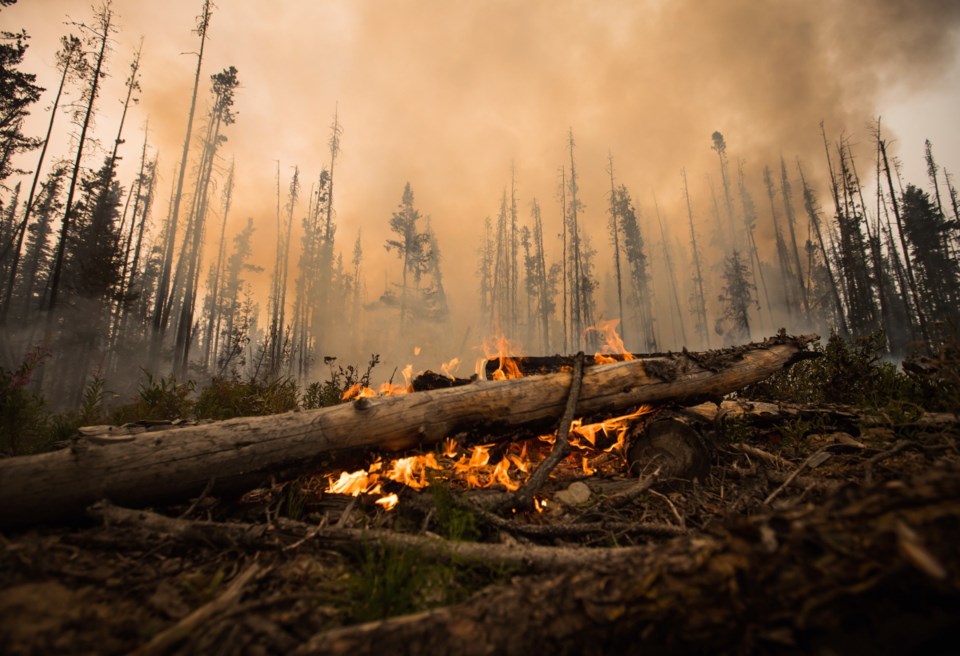Seven fires in seven days. Langford Fire Rescue recently reported that people discarding cigarette butts had ignited seven fires in the municipality between June 19 and June 25.
The butt-sparked spree happened just two weeks after Victoria Police Chief Del Manak ticketed a driver $575 for allegedly tossing a lit cigarette out a car window on Blanshard Street. Manak posted a photo of the ticket he promptly issued on Twitter, and news outlets across the south coast picked up the story.
Under the B.C. Wildfire Act, “A person must not start or risk starting an open fire in forest land or grass land, or within 1 km of forest land or grass land, by dropping, releasing or mishandling (a) a burning substance, or (b) any other thing that the person reasonably ought to know is likely to cause a fire.” Anyone who does so is subject to a $575 fine. Discarding a cigarette butt qualifies.
It was the second time Manak had raised the issue on social media. In September, he caught a driver throwing a lit cigarette from a vehicle, then speeding off. He gave that driver a speeding ticket, an $81 ticket for littering, and a lecture.
In 2017, West Shore RCMP tweeted a photo of a ticket they had issued to a driver who was seen tossing a cigarette butt in Langford. The individual admitted to the officer it was the second time he’d been caught for a similar offence. Earlier that year, another driver who threw a lit cigarette out his window in front of a police cruiser was also ticketed under the Wildfire Act.
Litter that can start a fire is a huge concern. At a more basic level, however, using our public spaces as trash cans also isn’t acceptable.
According to Report Litter Canada, littering is considered a morally acceptable offence in Canada. In an effort to help change that, the organization hosts a public-shaming website where people can post littering incidents to live online forevermore. Licence plate information, vehicle descriptions, and even post dash-cam video are also provided, raising possible privacy questions.
British Columbia licence plates feature frequently.
The posts detail everything from drink cups, soup cups, water bottles, pop cans, and entire bags of garbage being launched out of vehicles. Most, however, document tossed cigarette butts.
Cigarette butts are consistently the No. 1 form of litter found on local streets, parks, and beaches. Cigarettes tossed outside are washed into the region’s storm systems, then out to sea. Cigarette filters are made of cellulose acetate, yet another form of long-lived plastic choking our oceans and the creatures within them.
In addition, discarded cigarette butts contain all the same toxins that give smokers cancer. Once the butts enter our wetlands and oceans, those chemicals and heavy metals start poisoning wildlife.
According to a 2018 UBC study, the most common types of litter collected from southern B.C.’s beaches and coastlines are cigarettes and cigarette filters. Together, they accounted for almost 50 per cent of litter recovered from Strait of Georgia shorelines and in larger urban areas like Vancouver and Victoria.
The City of Vancouver analyzed its own litter. It found that cigarettes are the city’s most common litter item, with about one million cigarette butts tossed on Vancouver streets, parks, and beaches every single day. As a result, the city launched a campaign in June to reduce cigarette litter. Until the end of the summer, city staff are handing out reusable pocket ashtrays. If that doesn’t work, city bylaw officers will start handing out more $100-$10,000 fines.
That’s higher than the provincial fine for littering ($81).
Several B.C. municipalities, including Victoria, have installed cigarette disposal canisters where cigarette litter tends to accumulate. The material deposited in the containers is sold to TerraCycle, a company that recycles cigarettes and cigarette packaging.
However, bylaws banning smoking within seven metres of windows, doorways and air intakes meant many of the canisters had to be moved. Also, the canisters were often vandalized by people desperate to salvage cigarette butts to smoke.
So now we’re dealing with destruction of public property, on top of littering and Wildlife Act offences.
However, you needn’t resort to online shaming. You can also report tossed-cigarette incidents directly to the B.C. Forest Service (*5555) and any kind of littering or vandalism to police.



